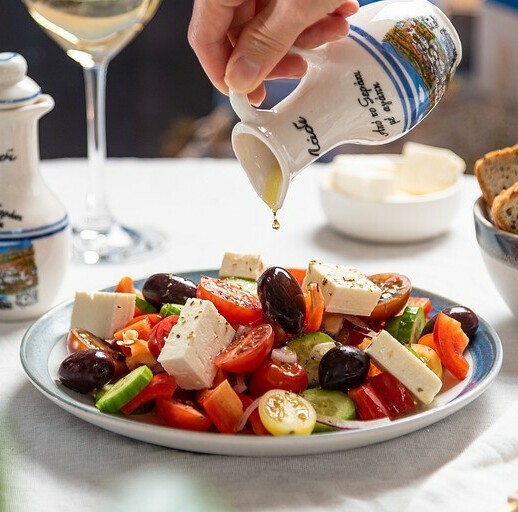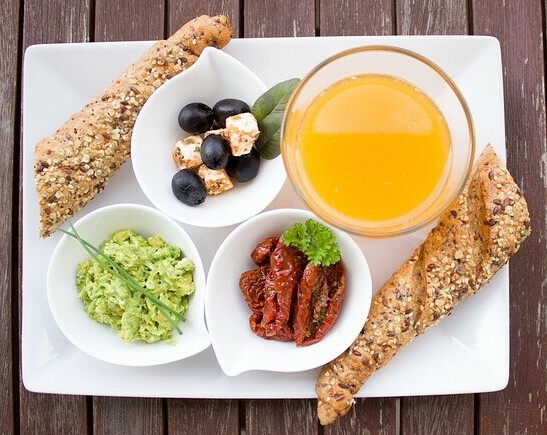Imagine a diet pattern that tantalizes your taste buds with delicious foods like fresh fruits, vegetables, whole grains, nuts, and olive oil and has many health benefits. That’s the Mediterranean Diet for you. Renowned for its heart-healthy and anti-inflammatory properties, this diet emphasizes plant-based foods, moderate protein intake from fish and poultry, and the judicious use of healthy fats.
You might be thinking, ‘How can this get any better?’ Enter Intermittent Fasting (IF), a dietary approach where individuals cycle between periods of eating and fasting. It’s gaining traction for its role in weight management, metabolic health, and even longevity.
The Mediterranean diet is a powerhouse—its popularity isn’t unwarranted. Studies have repeatedly shown its benefits, driving its adoption as a sustainable and enjoyable lifestyle choice. But we’re not just settling for one layer of benefits.
So, consider this: What if you could amplify those health perks? That’s where Intermittent Fasting swings into the picture. By synergizing the wholesome qualities of the Mediterranean diet with the metabolic advantages of timed eating, you might unlock an even more potent path to health and vitality.
If you’re hooked on the prospects of this combination, keep reading. In the next section, we’ll delve into the intricate dance between the Mediterranean diet and Intermittent Fasting, uncovering the potential of this dynamic duo to revamp your health regime.
What Is The Mediterranean Diet?
Before combining the Mediterranean diet with intermittent fasting, let’s first focus on the Mediterranean diet. Why would anyone want this diet? Why is it popular?
The Mediterranean diet focuses on whole, minimally processed foods. It emphasizes plant-based foods like fruits, vegetables, whole grains, nuts, and legumes. Healthy fats are included, primarily from olive oil and nuts. Fish and poultry are moderately consumed, but red meat and sweets are limited.
Besides the food, the Mediterranean diet promotes regular physical activity and the social and community aspects of eating, like sharing meals with family and friends.
It is famous for several reasons, including the fact that it includes a wide variety of tasty foods and is not overly restrictive about what you can eat. This makes it easy for people to enjoy what they eat and feel little to no guilt over it, a good balance between health and food enjoyment.
Numerous studies have linked the Mediterranean diet to a reduced risk of major cardiovascular events and certain cancers, improved glycemic control in diabetes, lower age-related cognitive dysfunction, and lower incidence of neurodegenerative disorders such as Alzheimer’s.
There are also some findings that adherence to the diet helps to improve depressive symptoms in those currently suffering from depression or those at risk of remission into severe depression.
The Synergy Between Mediterranean Diet and Intermittent Fasting
How do two distinct dietary paradigms work together? The answer lies in the inherent complementarity of the Mediterranean diet with the practice of intermittent fasting.
Following the Mediterranean diet, you focus on eating wholesome, unprocessed foods high in fiber, healthy fats, and lean proteins. Intermittent fasting isn’t about what to eat but rather when to eat. It organizes your eating patterns to cycle between periods of fasting and eating.
Syncing the Mediterranean diet’s nutritious offerings with intermittent fasting’s eating windows will likely enhance your body’s ability to manage weight and improve overall health. A nutrient-rich diet supports the body during fasting, potentially making intermittent fasting more comfortable and sustainable.
Key benefits of this syncretic approach could include heightened sensitivity to insulin, better control over appetite, and a boosted metabolic rate. This isn’t just about weight loss; it’s also about the comprehensive enhancement of your body’s functionality.
Now, don’t worry too much about jumping into both at once. Ease into this lifestyle by familiarizing yourself with the Mediterranean diet’s principles, then gradually introducing intermittent fasting. This way, you can adjust to each change without feeling overwhelmed.
When you’re ready to ease into Intermittent Fasting, learn more here.
Health and Longevity: The Twin Benefits
I will tell you something exciting: the Mediterranean diet and intermittent fasting aren’t just about losing weight. They’re about winning in the long game of health.
Now, what does this mean for you? When you marry the Mediterranean diet with intermittent fasting, you give your body a metabolic makeover. It’s not just about cutting calories; it’s about optimizing how your body functions on a cellular level. Think enhanced insulin sensitivity, better blood sugar control, and a kick-start in fat loss.
This isn’t just about what’s happening inside, though. It’s also about reducing widespread inflammation, and that’s a big deal. Inflammation is like an unwelcome guest in your body that can lead to a host of problems, including heart disease.
The good news is that studies suggest that the Mediterranean diet and intermittent fasting are proficient at showing inflammation the door.
Another major win? Heart health. The Mediterranean diet is like a love letter to your heart with all those omega-3s and antioxidant-rich foods. Intermittent fasting joins in by potentially lowering blood pressure and improving cholesterol levels. So together, they’re a dynamic duo, fighting the good fight to keep cardiovascular issues at bay.
As we transition into the practical side of things, remember that knowledge is power, but putting that knowledge into practice is what makes all the difference.
Practical Guide to Combining Mediterranean Diet With Intermittent Fasting
I’m here to help you combine the best of the Mediterranean lifestyle with the time-honored practice of intermittent fasting. It’s not just about what you eat or when you eat; it’s about harmonizing both for a healthier you.
Step #1: Starting with the Mediterranean Diet is your first step. Focus on whole foods like fruits, vegetables, whole grains, nuts, seeds, and a hearty splash of olive oil. Don’t worry too much about perfection. Choose something that resonates with you, perhaps beginning with simple swaps like replacing butter with olive oil.
Step #2: Integrate intermittent fasting into your routine. If you choose a method, the 16:8 practice is a popular one. It involves fasting for 16 hours and eating during an 8-hour window. If you’re not sure about a method, check this out.
Meal planning plays a huge role when you combine these two powerhouses. Think of a plate brimming with colorful vegetables, whole grains like quinoa or farro, and a protein such as grilled fish or legumes, all seasoned with herbs and spices. And remember, during your eating windows, savor your meals without rushing.
I’d love to share some meal ideas:
- How about starting your day with a Greek yogurt parfait with honey, nuts, and fresh figs?
- Or perhaps you’re in the mood for a lunch of lentil salad with tomatoes, cucumber, and feta.
Lastly, let’s talk about tips for sticking with it:
- It’s essential to stay hydrated during fasting periods – water, herbal teas, and black coffee are your allies here.
- Be flexible – life happens, and you might need to adjust your eating window.
- And always, always listen to your body.
- If you’re feeling off, reassess and make changes if needed.
Addressing Common Challenges and Misconceptions
So, you’re winding down this journey with a wealth of information on blending the Mediterranean diet with intermittent fasting. But no change in eating habits comes without its hiccups. You’re probably well aware of a few myths about The Mediterranean diet and intermittent fasting. I will set the record straight on a handful of these myths so you can munch fast and confidently.
One popular myth is that intermittent fasting is just an extreme calorie restriction. Not quite. While it’s true that you might eat less overall, the focus is more on when you eat, not just how much.
Many people think the Mediterranean diet is costly and complicated. I’m pleased to report that it’s pretty flexible and can be budget-friendly with some planning and savvy shopping.
Then there are the practical challenges, like navigating social events or maintaining your diet while traveling. Rather than seeing these as obstacles, view them as opportunities to flex your creative muscles. When dining out, look for the Mediterranean staples on the menu; the same goes for potlucks or dinner parties. As for travel, it’s a fantastic chance to explore local produce and fish markets—turn it into your Mediterranean adventure!
Remember, the ultimate goal is a sustainable, enjoyable way of eating that enhances your health without feeling burdensome. The minute you find it becoming taxing or joyless, it might be time for a quick reassessment. The beauty of the Mediterranean diet and intermittent fasting combo is that it’s inherently adaptable. You can constantly adjust your approach if something isn’t quite clicking.
Ultimately, what matters most is choosing something that resonates with you and fits into your lifestyle. By taking things one step at a time and staying open-minded, you’re positioning yourself for success.
I hope that by now, you feel inspired and ready to tackle this healthful way of living with gusto. Here’s to savoring every bite and embracing every fast to a life full of zest, vigor, and vitality.
Bon Appétit and happy fasting!
Interested in combining Intermittent Fasting with other diets? Check these posts out:



Hello again Seun, well kudos to you on another successful post. I really enjoy your writing style and how you incorporate your valuable information into your wordage. We have super parallel views on health and wellness so I feel right at home when reading your posts. I tend to lean directly into the Mediterranee way of eating and have for a very long time. It supplies me with so many delicious options and I love all the healthy fats. Plus I do really enjoy the freedom of entertaining and cooking and serving family style is very comforting to my family and I. I hope that this post gives others a lot of insight on how the lean proteins and veggies pair so well together while also being so delicious and healthy at the same time. One could also argue that this way of eating also pairs nicely with the occasional nice bottle of Chianti :))
Cheers (again)
Stacey
Thank you for saying you enjoy my writing style. I’m glad that you are enjoying my posts.
I no longer follow a specific diet outside of intermittent fasting, and the Mediterranean way of eating has appealed to me more and more. I have found many different options and meals that I enjoy through the foods in this option. The goal of enjoying eating around your community is also one of the best parts of the diet.